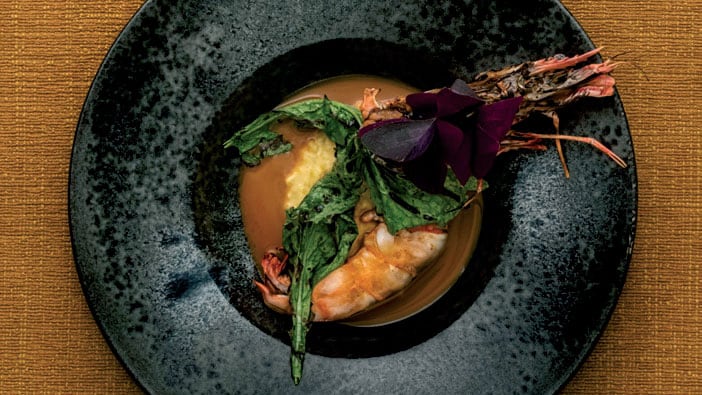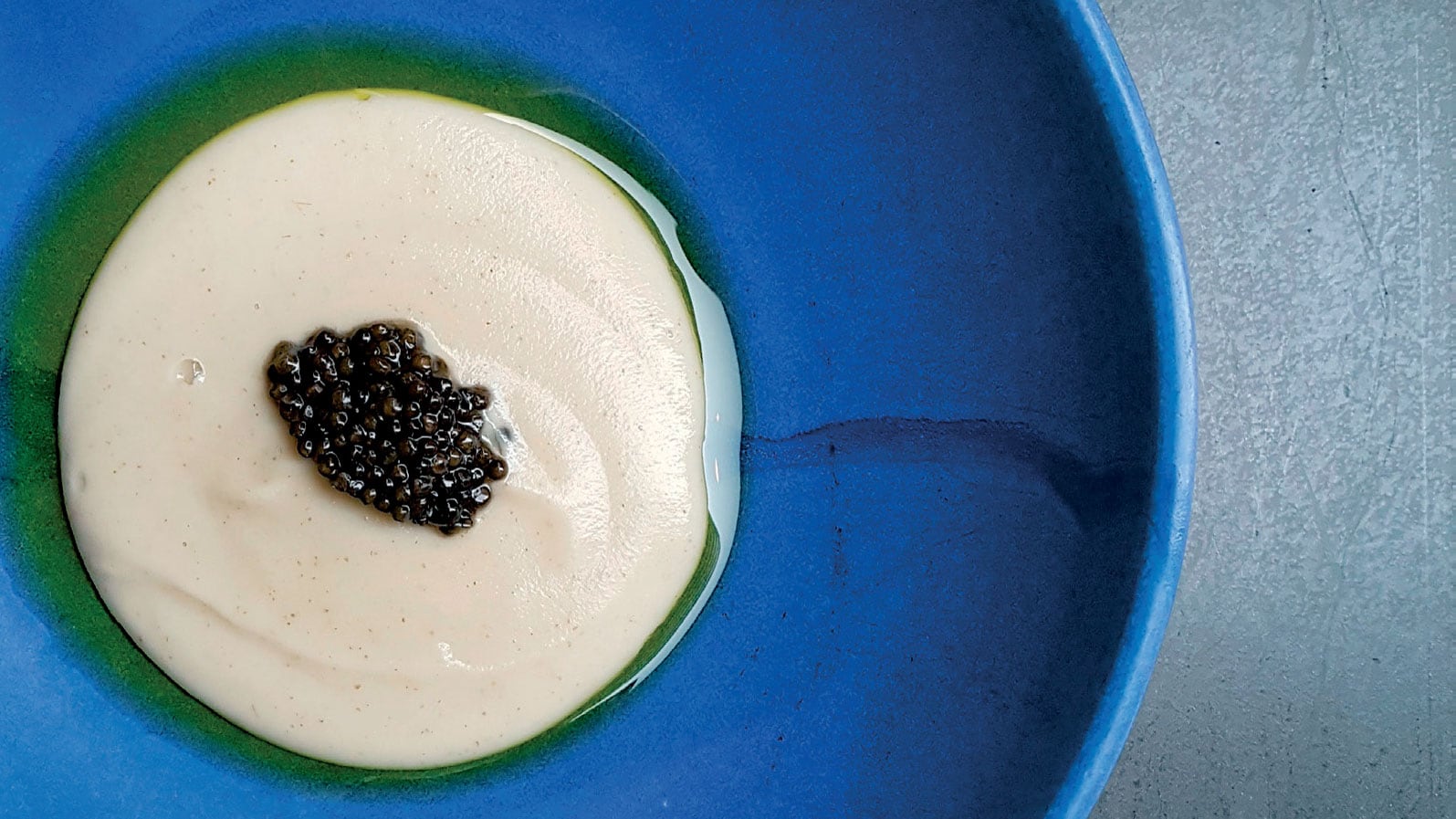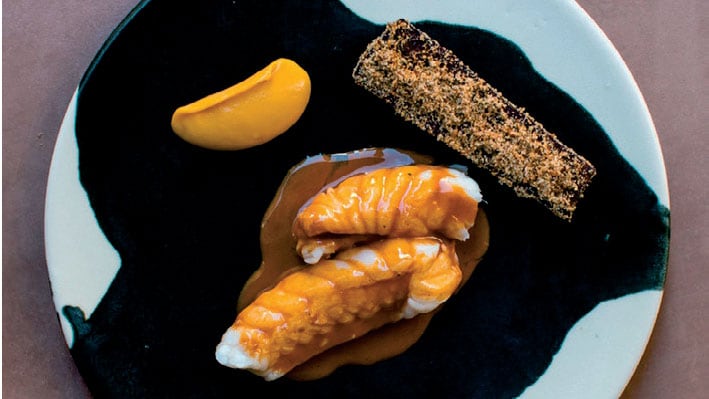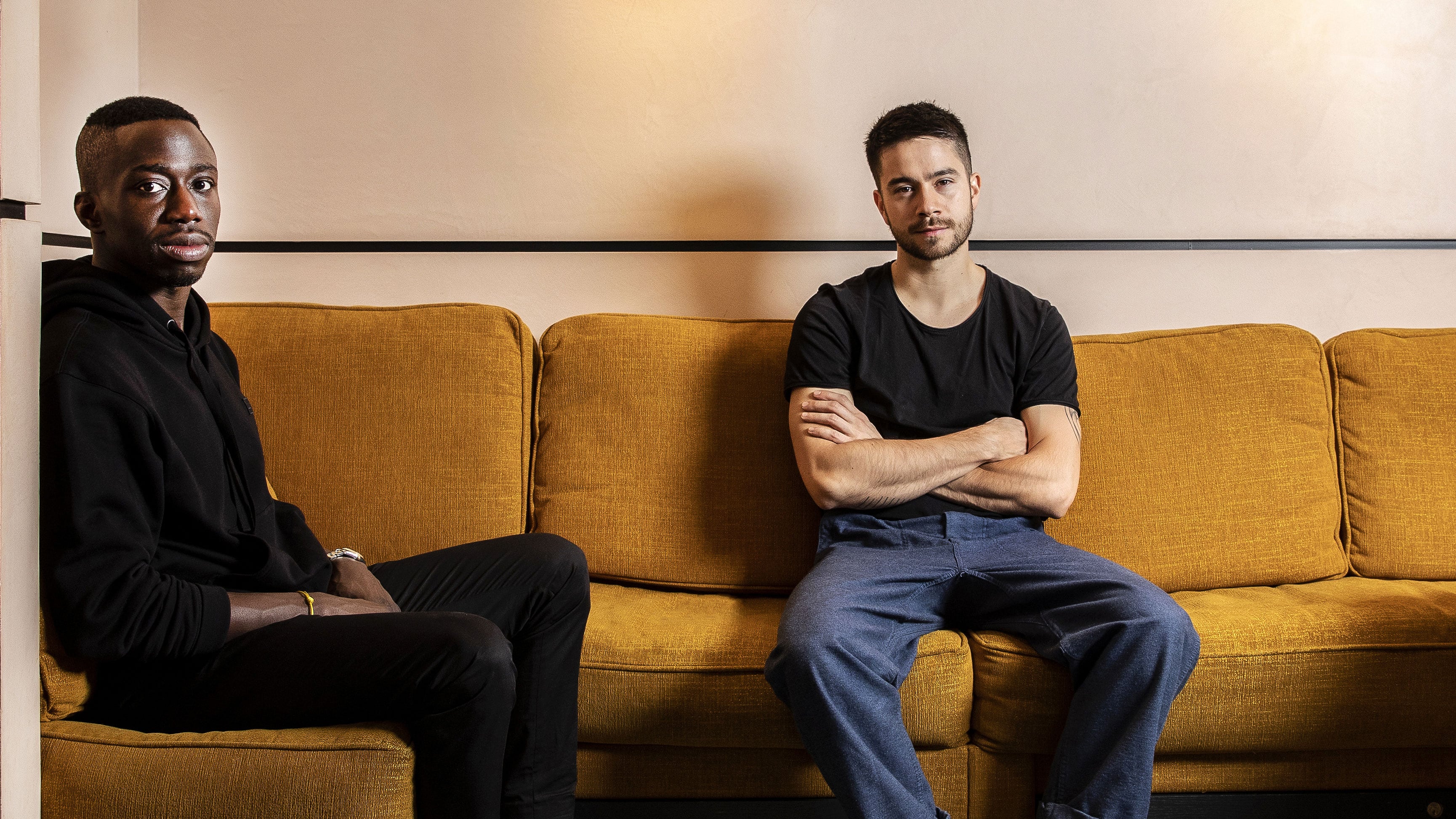Have I got your attention? That’s the question Jeremy Chan is asking with plantain, smoked scotch bonnet and raspberry. It is always the first dish that hits the table at Ikoyi and the only one that has been on the menu since its inception.
Two slices of fried plantain are dusted with a bright red powder and served alongside a small dollop of mayonnaise. It’s an aesthetically striking dish, but it doesn’t look like it’s going to be delicious.
It is. In fact, it is a near perfect dish. An initial hit of fat, salt and acidity is followed by a whoosh of intense but carefully judged chilli heat coming not from the red powder – which is actually a mix of freeze-dried raspberry and salt – but from the more innocuous looking mayonnaise.
It’s a provocative plate of food and sets the scene for a singular restaurant experience that challenges preconceptions about west Africa and its ingredients while simultaneously posing extensional questions about the make-up and role of a modern and creative fine-dining restaurant.
The 31-year-old launched Ikoyi with Nigerian-born friend and business partner Iré Hassan-Odukale (32) in the summer of 2017 just south of Piccadilly Circus. Though it is named after a district in the Nigerian city Lagos, the dishes at Ikoyi aren’t re-imaginings of those of west Africa, although – rather confusingly – some do reference well-known dishes including jollof rice, the barbecue dish beef suya and the vegetable soup efo.
West African influences and ingredients are rolled in with Chan and Hassan-Odukale’s food memories to create – as Chan puts it – “moments of heightened beauty reformulated for others to experience”.
It’s esoteric stuff, then. But Chan’s cerebral and, at times, baffling creative process and focus on flavours that many will have never experienced somehow translates into dishes that are as accessible as they are delicious.
An untypical cooking CV
The son of a Chinese lawyer and a Canadian ballet teacher, Chan was born in the north-west of England but spent much of his childhood and teens in Hong Kong and the US. He is fiercely intelligent with a degree in Language and Philosophy from famed New Jersey university Princeton and briefly worked for a private equity company before cooking at high-profile restaurants including Noma, Hibiscus and Dinner by Heston Blumenthal.
Born in Lagos, Hassan-Odukale moved to England for sixth form where he met Chan. He too pursued an academic path and followed in his father’s footsteps to work in insurance, latterly as an underwriter.
The pair share a quiet intensity but are affable and open, with both appearing to relish the chance to reflect on and analyse their restaurant, which will celebrate its second anniversary this summer.
Ikoyi was born when Hassan-Odukale asked Chan to help him open a Nigerian restaurant. “I didn’t have anything else to do,” recalls Chan. “I’d recently stopped working as a chef and was feeling lost. All my peers had proper jobs and were doing well. I’d been working in kitchens and had no savings. At that time I didn’t even know whether or not I wanted to be a chef.”
Things didn’t start well. The pair cooked dishes together but were underwhelmed by their creations. A brief trip to Nigeria didn’t auger well either: Chan didn’t really enjoy or connect with the food.
Though the duo are able to laugh about it now, one gets the sense their creative partnership was on the brink of crumbling during this period.
“I remember being at Ire’s flat in Lagos and thinking ‘what are we going to do with this food?’. I didn’t relate to it and didn’t see how it could be relatable to London either.”
But Chan persevered, locking himself away in The British Library with books, scientific journals and medical studies related to west African ingredients.
“This helped because it allowed us to explore our relationship with west African ingredients and its wider food culture,” says Hassan-Odukale. “We decided that to make it relatable to London and ourselves, we needed to explore the connection with west Africa to the rest of the world.”
“We were trying to create an easily digestible narrative for our customers and our landlord and branding packs,” interjects Chan. “What we really wanted to do was use great ingredients to cook delicious things and create a restaurant of substance and integrity. We weren’t trying to find a USP or gimmick to fill a gap in the market.”
Just before the launch, Chan and Hassan-Odukale spelled out their vision in this very magazine. They were clear that Ikoyi was not a west African restaurant (traditional or otherwise), rather an exploration of their tastes and background that would use west Africa for “flavour, inspiration and context”.
They needn’t have bothered. As soon as people heard the phrase ‘west African’ Ikoyi became a west African restaurant. “It was out of control,” says Hassan-Odukale. “We weren’t happy with either the restaurant or the way it was being perceived. We became the champions of west African food in London. We weren’t.”
Universally misunderstood
This proved an acutely uncomfortable place to be. Non-west African people were confused because they thought they were going out ‘for a Nigerian’ and west African people were – on the whole – furious that their cuisine was being played around with.
“There was a really harmful period in which our restaurant was solely frequented by Nigerians that absolutely hated it,” says Hassan-Odukale. “All the food was coming back to the kitchen. Some even asked why there were some many white and Chinese faces in the kitchen.”
Ikoyi was busy and received some positive reviews early doors but, once the initial buzz died down, Chan and Hassan-Odukale were left with a virtually empty restaurant (Ikoyi’s central yet somehow out-of-way location in the St James’s Market development certainly didn’t help).
“We were dying,” says Chan. “It was an absurd situation. Here we were, in this super high-end location, living a hand-to-mouth existence.”
The pair’s response was to channel the anger and frustration that came with running a dead and nearly universally misunderstood restaurant into making Ikoyi the best it could possible be. If they were to go down, they would do so fighting.
À la carte was dropped in favour of a £65 tasting menu and a lunchtime-only set menu. Not only did this raise spend per head, it also allowed Chan and his team to increase food quality and solved the problem of diners not knowing what to order when presented with a menu packed with unfamiliar dishes and ingredients.

A star is born
Timed to coincide with Ikoyi’s first birthday, this change in attitude and proposition had an almost immediate beneficial effect on business and – just a few months later – Ikoyi won a Michelin star.
A star is – of course – a big deal for any restaurant, but it is an especially significant accolade for Ikoyi. It is now arguably the only starred restaurant in the world that truly champions indigenous African ingredients, a continent that is famously under-represented and undervalued when it comes to gastronomy.
“We’re pleased we’ve brought some awareness to the region. It’s a testament to the ingredients,” says Chan, who is understandably nervous of claiming a first seeing that his relationship status with Africa falls into the ‘it’s complicated’ bracket.
Was the star a shock? Yes and no. “We weren’t working towards it and we didn’t quite expect it,” Chan continues. “But it wasn’t a surprise in the sense that we looked at the guide’s criteria and at that level inspectors are looking for quality of ingredients, consistency and personality. Not to sound arrogant, but Ikoyi fulfils that criteria as much as any other [starred] restaurant in this country.”
Going in blind
Ikoyi is one of a handful of restaurants at its level to serve a ‘blind’ tasting menu (Mikael Jonsson’s Chiswick restaurant Hedone is another). There is a sample menu online but diners don’t know what they’re going to get until they sit down at the table.
“We want to be spontaneous and to do different things for different tables depending on how many ingredients the kitchen has. It also makes it easier for us to deal with dietaries,” says Hassan-Odukale.
For Chan, the blind menu appears to be more about pushing his own creative limits and applying controlled pressure to his kitchen team, which is headed by former River Café chef Gaz Herbert.
“It’s better to hone and perfect food in the moment,” he says. “If it becomes a standard rote system it becomes boring, and that means it doesn’t taste as good. There needs to be an element of stress. We still have quality control and precision, but it’s mouldable to the seasons and what we happen to have in the kitchen that day.”
Mystical dish development
Chan’s dish creation processes is starkly different to that at Dinner – the restaurant in which he spent the most time employed as a chef – or indeed any other ambitious, research-driven establishment. At the heart of such kitchens is a philosophy of continuous improvement and – almost always – a collaborative work flow with teams of people tasked with tweaking and revising dishes.
At Ikoyi, all the development is handled by Chan. Actually, development is perhaps not the right word seeing as no experimentation or modification takes place. Chan thinks of a dish, writes it down to the gram and then cooks it.
“It’s a bit weird. I can taste it in my imagination,” is Chan’s response when quizzedon his near mystical dish-birthing process. While dishes come and go from the menu, once they’re created they don’t change in any meaningful way, although Chan is open to suggestions from the team that relate to the steps the kitchen needs to take to reach a set outcome.
If these were ingredients Chan had grown up with it would be more plausible, but these are ingredients that he’s only been dealing with for a few years.
Hassan-Odukale is as bemused by all this as everyone else. “He thinks about it for a bit and then cooks it. He puts dishes on the menu he’s never tried and serves them to a full restaurant.”
The inspiration for Chan’s dishes are varied. One is inspired by the pair’s obsession with fried chicken (especially that of a certain colonel), and sees a carefully brined, spiced and fried slice of chicken breast coated with a chicken glaze prepared with isot-biber chillies and served with steamed, pickled and blow-torched Roscoff onions.
Another is a take on a traditional west African dish of mashed potatoes and egg yolks: selim (a musky-tasting grain), black garlic and uziza (peppery leaves) are infused into a cream topped with a purée of tigernuts (actually a type of potato) and beetroot and finished with a spoon of golden caviar to create a dish that’s every bit as striking and otherworldly as Ikoyi’s now iconic plantain dish.
“Image is important to me,” says Chan. “People need visual cues. Restaurant brands and chefs need symbols. If you’re not identifiable, you can get lost. The plantain dish is important for us because it’s a bold symbol. I’m not saying it’s perfect. But for me, it’s the most perfect dish I’ve created. I won’t take it off the menu until I can think of a better one.”

No short measures
Though menus are created on the fly, Chan has a rigorous monitoring regime and is obsessive about timings and weights (he often times his brigade to ensure his instructions are being followed to the letter).
When dealing with powerfully flavoured ingredients – of which there are many at Ikoyi, including obscure chillies, peppers and other spices – consistency is achieved by using the same suppliers and using ingredients in very specific quantities.
“We aim to give people a clean flavour that’s intense without being too much. For the scotch bonnet mayonnaise used in the plantain dish, we infuse the oil with smoked chillies so you’re not eating any solid chilli matter. But that one is designed to inflict a little pain.”
Ikoyi’s kitchen is low-tech; a Thermomix and a waterbath is about as fancy as it gets for Chan and team, with Ikoyi’s striking visuals achieved through traditional means.
“I like the idea of manipulating organic material and making it look synthetic, but without using gelling agents or any of that molecular stuff,” says Chan. “Our main tools are knife skills and time. I like to cut things in a certain way. I love the way you can make a celeriac appear like marble with just a good knife, water, salt and olive oil.”
A good example of this is Ikoyi’s showstopping cabbage and groundnut dish, which appears to be raw save for a light charring but is actually perfectly cooked. To achieve this effect, the cabbage is steamed, chilled down, charred on a grill and then basted in a pan with turmeric butter just as many restaurants cook meat.
The kitchen at Ikoyi is so small they’d be no room for fancy kit even if Chan wanted it. In fact, the squeeze on storage is so extreme that Ikoyi has had to come to a special arrangement with some suppliers, which deliver small amounts of produce every day.
A condensed drinks offering
The restaurant’s tiny footprint also has an impact on the drinks offering. With no cellar to speak of, wine has to be locked away under the banquettes, with small amounts taken out for each service.
This has resulted in an unusually brief list for a restaurant of Ikoyi’s ambition, but one that has been carefully tuned to complement Chan’s spice-driven cooking. “We can’t do tannic reds, which is occasionally problematic as some customers just want a heavy red,” says Hassan- Odukale. “For whites, acidity and an aromatic element are key.”
Ikoyi doesn’t have a sommelier; unusually the wine list is handled collectively by the senior front-of-house and kitchen teams (former Marianne Lumb head chef Miles Strotton provides a bridge between the two teams, doing some shifts in the kitchen and some front of house).
Created in partnership with Max and Noel Venning of Three Sheets Bar, Ikoyi’s cocktails use west African ingredients and are high in alcohol to punch through the spice. Highlights include Roast Plantain Old Fashioned (caramelised plantain, butter, Plantation 5 rum) and Cassava Sour (cassava, lemon juice, Russian Standard vodka).

An uncompromising approach
The service at Ikoyi is intentionally low key. While many of the ingredients and flavours will be unfamiliar to most diners, there is no pointing at ingredients on plates or verbose table-side descriptions.
The strategy is to tell people the key flavours to focus on, with a considerable amount of attention paid to the order and phonaesthetic quality of the words.
“It’s an instruction: plantain, smoked scotch bonnet, raspberry salt. We’re trying to make an impact,” says Chan, who likens Ikoyi’s approach to that of a wall label in an art gallery: there’s the title that tells you the basics and then a second tier of information for those that request it.
While the service is relaxed and friendly, there is something refreshingly uncompromising about the overall experience at Ikoyi. Chan and Hassan-Odukale are breaking new ground, and as such have accepted that they can’t please everybody.
“If we listened to everyone’s viewpoint, we’d end up with a bland mess with no kick to it,” says Chan. “If it’s too spicy for you, don’t eat here. We’re trying to make this restaurant as good as it can possibly be. I’m fighting for total control of my creativity.”
This is a web version of an article that first appeared in the March issue of Restaurant magazine, the leading title for the UK's restaurant industry. For more features, comment, interviews and in-depth analysis of the restaurant sector subscribe to Restaurant magazine here

